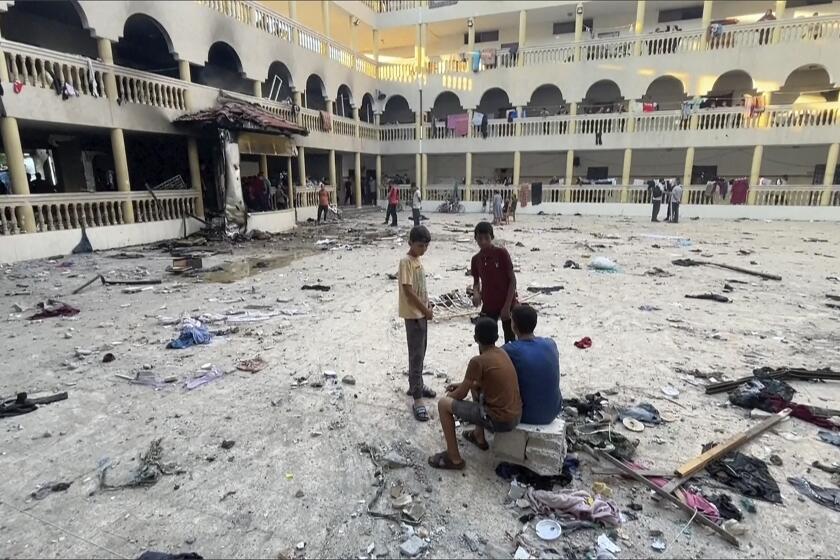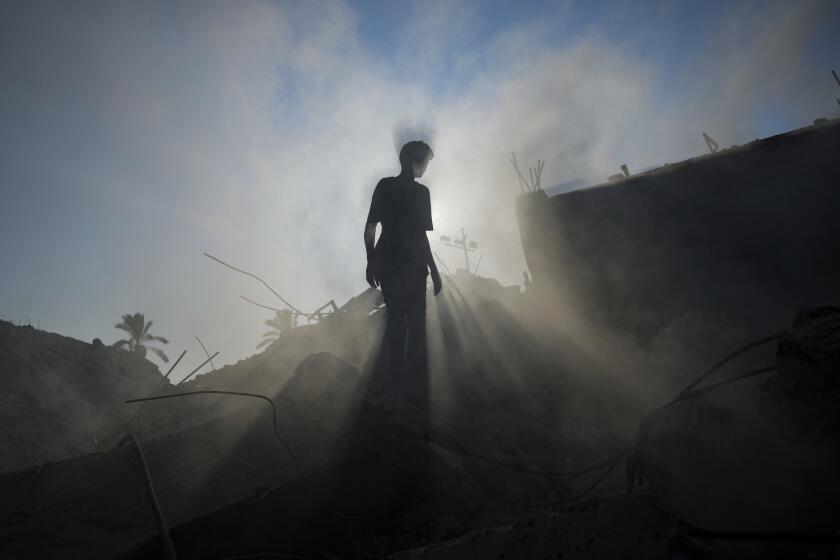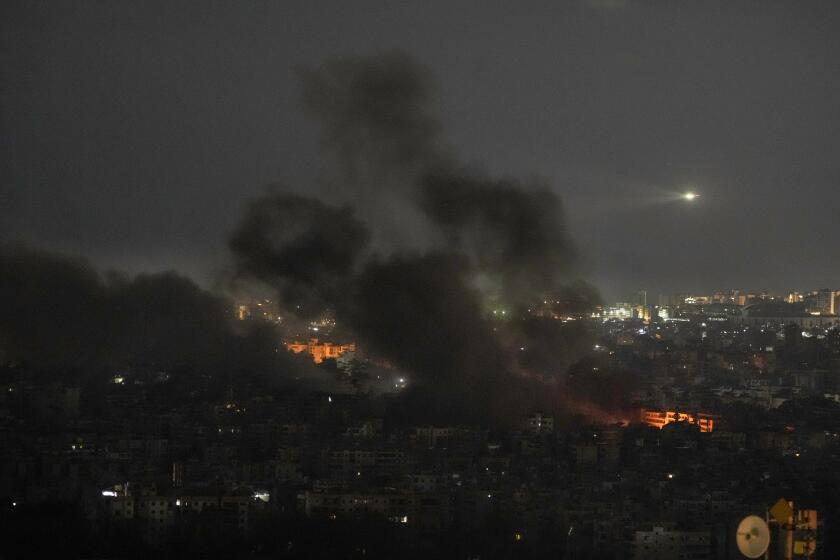Israeli strike on school-turned-shelter in Gaza kills 27

- Share via
DEIR AL BALAH, Gaza Strip — An Israeli strike on a school sheltering the displaced in the Gaza Strip killed at least 27 people Thursday, Palestinian medical officials said. The Israeli military said it targeted militants, but people sheltering there said the strike hit a meeting of aid workers.
Israel has continued to strike at what it says are militant targets across the Palestinian enclave even as attention has shifted to its war against Hezbollah in Lebanon and rising tensions with Iran. The military launched a large-scale air and ground operation against Hamas in northern Gaza this week.
In a separate development, the United Nations peacekeeping force in southern Lebanon said an Israeli tank fired on its headquarters in the town of Naqoura, hitting an observation tower and wounding two peacekeepers, who were hospitalized.
The Israeli military said it was looking into the incident.
United Nations Interim Force in Lebanon, known as UNIFIL, said in a statement that its headquarters and nearby positions “have been repeatedly hit.” It said the army also fired on a nearby bunker where peacekeepers were sheltering, damaging vehicles and a communication system. It said an Israeli drone was seen flying to the bunker’s entrance.
A year after the Oct. 7 attack that spurred the Gaza war, Israelis and Palestinians reflect. In their voices, they chronicle a devastating day, tragic year.
Strike on shelter appears to have targeted Hamas-run police
A child and seven women were among the 27 people killed in the central Gaza city of Deir al Balah, according to the Al Aqsa Martyrs Hospital, where the bodies were brought. It said several other people were wounded.
An Associated Press reporter saw ambulances streaming into the hospital and counted the bodies, many of which arrived in pieces.
The Israeli military said it carried out a precise strike targeting a militant command-and-control center inside the school, without providing evidence. Israel has repeatedly attacked schools that were turned into shelters in Gaza, accusing militants of hiding out in them.
Witnesses said the strike occurred while school managers were meeting with representatives of an aid group in a room normally used by Hamas-run police who provide security. They said there were no police in the room at the time.
The Palestinian branch of Terre des Hommes, a Swiss aid group, said in a statement that members of one of its children’s health teams were killed in the strike, though it did not specify how many.
“There were no militants. There was no Hamas,” said Iftikhar Hamouda, who had fled from northern Gaza earlier in the war. “We headed to tents. They bombed the tents. ... In the streets, they bombed us. In the markets, they bombed us. In the schools, they bombed us,” she said. “Where should we go?”
An Israeli airstrike hit a school and mosque complex used as a shelter in Gaza City, killing at least 80 people, Palestinian health authorities say.
The Hamas-run government in Gaza operated a civilian police force numbering in the tens of thousands. Those officers largely vanished from the streets after the start of the war as Israel targeted them with airstrikes, but plainclothes Hamas security personnel still exert control over most areas.
Hamas has continued to launch attacks on Israeli forces and fire occasional rockets into Israel more than a year after its Oct. 7 attack ignited the war.
Hamas-led militants stormed into Israel and rampaged through army bases, farming communities and a music festival in that attack, killing some 1,200 people, mostly civilians, and abducting around 250 others. They are still holding around 100 captives, a third of whom are believed to be dead.
Israel’s offensive has killed more than 42,000 Palestinians, according to local health authorities, who do not say how many were fighters but that women and children make up more than half of the fatalities. The war has destroyed large areas of Gaza and displaced around 90% of its population of 2.3 million people, often multiple times.
U.N. peacekeepers caught in intensified fighting in Lebanon
UNIFIL, which has more than 10,000 peacekeepers from dozens of countries, was created to oversee the withdrawal of Israeli troops from southern Lebanon after Israel’s 1978 invasion. The U.N. expanded its mission after the 2006 war between Israel and Hezbollah, allowing peacekeepers to patrol a buffer zone set up along the border.
Israeli airstrikes hit a school sheltering displaced Palestinians in central Gaza, killing dozens. Military orders evacuation from a humanitarian zone.
Israel accuses Hezbollah of establishing militant infrastructure along the border in violation of the U.N. Security Council resolution that ended the 2006 war. It has warned people to evacuate from dozens of communities in southern Lebanon, many of which are outside the buffer zone.
The attack drew widespread condemnation and prompted the Italian Defense Ministry to summon Israel’s ambassador in protest.
The two UNIFIL troops wounded in the attacks and hospitalized are Indonesian, Italy’s Foreign Minister Antonio Tajani said.
The Israeli military acknowledged opening fire at a U.N. base in southern Lebanon on Thursday and said it had ordered the peacekeepers to “remain in protected spaces.”
The European Union’s top diplomat, Josep Borrell, sharply condemned Israeli strikes that hit UNIFIL positions as “an inadmissible act, for which there is no justification.”
From Italy, which has about 1,000 soldiers deployed as part of UNIFIL, Defense Minister Guido Crosetto went further, claiming Israel deliberately targeted the UNIFIL base in southern Lebanon in strikes that “could constitute war crimes.”
Several other countries, including France, Spain and Jordan, also denounced the Israeli attacks.
The U.N. peacekeeping chief, Jean-Pierre Lacroix, said last week that peacekeepers would stay in their positions on Lebanon’s southern border despite Israel’s request to vacate areas before it launched its ground operation against Hezbollah.
Israel expanded its bombardment in Lebanon, hitting Beirut’s southern suburbs with airstrikes and striking a Palestinian refugee camp in northern Lebanon.
“The U.N. and Italy cannot accept orders from the Israeli government,” Crosetto said.
Hezbollah began firing rockets into Israel on Oct. 8, 2023, in support of Hamas and the Palestinians, drawing Israeli airstrikes in retaliation.
The fighting has steadily escalated, with Israel recently carrying out waves of heavy strikes across Lebanon and launching the ground invasion. Hezbollah has expanded its rocket fire to more populated areas deeper inside Israel, causing few casualties but disrupting daily life.
Israel says the ground invasion, which has so far focused on a narrow strip along the border, is aimed at pushing the militants back so that tens of thousands of Israelis can return to their homes in the north. The fighting has displaced more than a million people in Lebanon.
Iran supports Hamas, Hezbollah and other armed groups across the region that refer to themselves as the “axis of resistance” against Israel. Iran launched some 180 ballistic missiles at Israel last week in retaliation for the killing of top Hamas and Hezbollah militants.
Israeli Defense Minister Yoav Gallant said Wednesday that its response to the Iranian missile attack will be “lethal” and “surprising,” without providing further details, as Prime Minister Benjamin Netanyahu spoke with President Biden.
Associated Press writers Hussein and Shurafa reported from Deir al Balah and Magdy from Cairo. AP writers Kareem Chehayeb in Beirut and Melanie Lidman in Tel Aviv contributed to this report.
More to Read
Sign up for Essential California
The most important California stories and recommendations in your inbox every morning.
You may occasionally receive promotional content from the Los Angeles Times.














